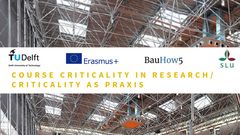Critical thinking, an interactive process that puts theory and practice into productive contact, deploys the active power of thinking to destabilize apparently stable worlds (Dewey). Criticality goes further still. As a socially situated thinking practice, reflecting and acting criticality exposes a disposition to position oneself outside received frameworks of understanding to engage other-wise, and in other ways, with the world (Davies). Such critical processes and practices do not belong to any one disciplinary domain or practice-based arena. Rather, they proffer tools for observing and gleaning understandings from the many forums through which useful knowledge gets produced, and operates.
Thanks to its simultaneous embrace of academic research and professional practice, landscape architecture’s design field harbors critical – in the sense of significant – potential to synthesize distinct work modes, operational methods, and forms of knowledge. The practice of designing urban landscapes involves weaving together insights and know-how from many academic disciplines (natural and social sciences, technology, humanities, etc.) and non-academic professional arenas (industry, politics, culture, and more). Thinking critically – in the senses of reflectively and seriously – about how such interactive interweaving happens can yield valuable knowledge for grappling creatively with challenges arising from uncertainties surrounding urban futures as well as important research questions for theoretical consideration.
Critical theory recognizes that practice always and already informs the work of theorists (Brenner). It is also attentive to the circumstances conditioning its production. As such critical theory, like criticality, is always both a reflective and situated practice. Building upon these fundamentals, this course, “Criticality in Research/Criticality as Praxis”, aims to mobilize the insightful force of critical thinking to enrich and help evolve epistemological norms and received practices towards new forms of knowledge production. It offers participants a chance to engage with texts on critical theory, critical thinking, criticality and reflexivity; analyze publications written from a critical perspective on urban landscape futures; and undertake an exercise in critical writing. Adopting a landscape architectural perspective, it welcomes researchers from multiple disciplines, in order to rehearse interactive and synthetic critical thinking processes. It is open to participants who wish to sharpen understanding of their own research aims within broader disciplinary contexts, and to strengthen their capacity, as researchers, to contribute to the evolution of landscape knowledge for sustainable urban futures.
The core of the course is an intensive 2-day seminar (with four 1⁄2 day-sessions scheduled over 3 days, in fall 2020) that will take place at THE FACULTY OF ARCHITECTURE AND THE BUILT ENVIRONMENT, TU Delft, The Netherlands, from 5 to 7 October 2020. The timing is such that participants may have an opportunity to attend the International Architecture Biennial Rotterdam, (assuming no scheduling changes to the IABR 2020).
When:
05.10.20, 13-17h
06.10.20, 8:45-17:30h
07.10.20, 9-13h
Where:
TU Delft
Faculty of Architecture and the Built Environment
Open to:
registered PhD students in fields concerned with urban landscape futures (design, planning, environmental science, landscape architecture, architecture, urban history, ecology, architecture, sustainability studies etc.)
Course responsible:
Lisa Diedrich, Prof. of Landscape Architecture/Director, SLU Urban Futures
Andrea Kahn, Prof. of Site Thinking in Research and Design, SLU Landscape
Language:
English
Credits:
4 ECTS
If you would like to apply, please submit the following to SLU Profs. Lisa Diedrich & Andrea Kahn by 15.06.20:
- 1-page abstract of your PhD, including title of the research project
- 1-paragraph statement with your motivation for participating in this course
- PhD start date, name of supervisor(s) and home institution
